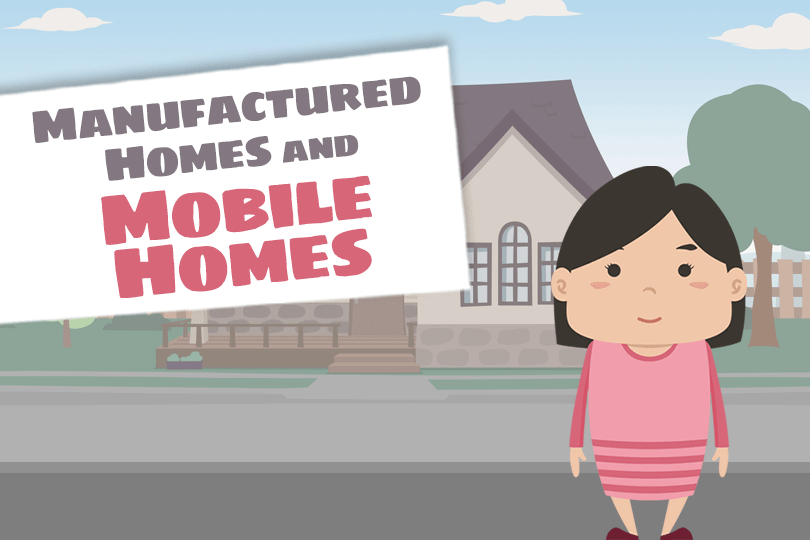Mobile, Manufactured, and Modular Homes: Now You Know
October 17, 2022
So let’s go over these building types and learn about what makes them different than any other house on the block.
Mobile Homes
Technically speaking, every mobile home in America was built before 1976. To understand this distinction, you’ll need to learn how and why mobile homes came about in the first place. In 1945, much of the U.S. workforce was sent to fight in World War II, which created a vacuum in the manufacturing industry. To accommodate for this loss, the government set up housing communities with mobile homes and trailers around large factories for the new, temporary workers coming in from around the country.
When veterans returned from the war to start over and rejoin the workforce, demand for these mobile homes grew overnight. This led to them being constructed quickly and poorly, giving them a reputation that Americans still believe to this day.
So why is the date, June 15, 1976 a deadline for these houses to be termed “mobile homes?”
Manufactured Homes
Mobile homes kept gaining popularity over the years, but they were also evolving, becoming longer and wider and looking more like regular homes than trailers. In 1974, the HUD submitted the National Mobile Home Construction and Safety Act (the “HUD code”). This reclassified “mobile homes” as “manufactured homes” and established new construction and safety standards, addressing essential home systems issues such as heating, plumbing, and electrical wiring. Unlike mobile homes, manufactured homes are built in factories, minimizing factors that can weaken construction, such as weather damage and human error. To be classified as a manufactured home, the structure must have a steel chassis and welded tongue for towing to the homesite, and must carry an exterior HUD ID tag and interior manufacturer’s data plate.
Modular Homes
A new reiteration of manufactured homes came with “modular housing.” Similar to manufactured homes, modular homes are built in an indoor setting, but the separate sections of the home are built without steel chassis or towing gear. They are then transported on flatbed trucks and assembled at the homesite. These modular homes appear almost indecipherable from site-built homes, and are subject to the same local and state housing rules and regulations. Unlike manufactured homes that can be set on blocks, masonry, footings or a permanent foundation, modular homes must have a permanent foundation.
Some advantages that modular homes have over homes built on-site are the design flexibility for the buyer, ability to move the home entirely, and quick, indoor construction.
Does the FHA Allow It?
Many potential homebuyers are surprised to learn that the FHA allows approved lenders to finance manufactured and modular homes. To be eligible for FHA mortgage insurance, the manufactured home must be built after June 15, 1976 (which means NO mobile homes), and there must be a certification label to prove it. It also mandates that manufactured home floorspace cannot be smaller than 400 square feet and must be classified as real estate.
Additionally, the FHA allows borrowers to apply for the FHA One-Time Close loan program on both manufactured and modular homes. Learn more about the FHA’s One-Time Close loan process.
------------------------------
RELATED VIDEOS:
Here's the Scoop on Conventional Loans
When Do You Need a Cosigner?
Analyzing Your Debt Ratio

FHA Loan Articles
June 15, 2023When you buy a home with an FHA mortgage, cash for closing costs and your down payment is required. It would be easy to assume you simply give the lender cash in the specified amount and that’s the end of the story.
May 20, 2023Did you know there is an FHA loan option that lets you build a house from the ground up? You can use this mortgage to build on land you own or on land you buy as part of the loan. But you will want to address some issues comparing construction loan options.
May 3, 2023Sometimes when buying a home there may be a question of surplus or excess land. You likely won’t face this issue when buying a condo unit, but for other types of purchases, this may be an important factor in the appraisal process.
April 18, 2023Your lender is required to make sure you can realistically afford your mortgage, and that means verifying that your income is stable, reliable, and will continue after your mortgage has closed. What some don’t realize about this process is that there are standards for verifying income.
April 1, 2023FHA loan rules for single family purchase loans include guidelines for the lender to use if the applicant has rental income. Some want to know whether it is possible to qualify for an FHA mortgage using rental income. The real issue is whether the rental income meets FHA loan rules.







